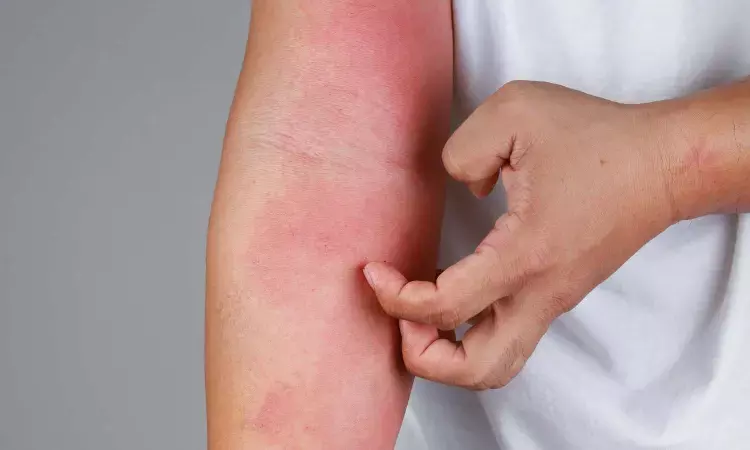- Home
- Medical news & Guidelines
- Anesthesiology
- Cardiology and CTVS
- Critical Care
- Dentistry
- Dermatology
- Diabetes and Endocrinology
- ENT
- Gastroenterology
- Medicine
- Nephrology
- Neurology
- Obstretics-Gynaecology
- Oncology
- Ophthalmology
- Orthopaedics
- Pediatrics-Neonatology
- Psychiatry
- Pulmonology
- Radiology
- Surgery
- Urology
- Laboratory Medicine
- Diet
- Nursing
- Paramedical
- Physiotherapy
- Health news
- Fact Check
- Bone Health Fact Check
- Brain Health Fact Check
- Cancer Related Fact Check
- Child Care Fact Check
- Dental and oral health fact check
- Diabetes and metabolic health fact check
- Diet and Nutrition Fact Check
- Eye and ENT Care Fact Check
- Fitness fact check
- Gut health fact check
- Heart health fact check
- Kidney health fact check
- Medical education fact check
- Men's health fact check
- Respiratory fact check
- Skin and hair care fact check
- Vaccine and Immunization fact check
- Women's health fact check
- AYUSH
- State News
- Andaman and Nicobar Islands
- Andhra Pradesh
- Arunachal Pradesh
- Assam
- Bihar
- Chandigarh
- Chattisgarh
- Dadra and Nagar Haveli
- Daman and Diu
- Delhi
- Goa
- Gujarat
- Haryana
- Himachal Pradesh
- Jammu & Kashmir
- Jharkhand
- Karnataka
- Kerala
- Ladakh
- Lakshadweep
- Madhya Pradesh
- Maharashtra
- Manipur
- Meghalaya
- Mizoram
- Nagaland
- Odisha
- Puducherry
- Punjab
- Rajasthan
- Sikkim
- Tamil Nadu
- Telangana
- Tripura
- Uttar Pradesh
- Uttrakhand
- West Bengal
- Medical Education
- Industry
Tralokinumab safe and effective in treating atopic dermatitis: JAMA

A new study published in the Journal of American Medical Association suggests that when used to treat adolescents with moderate to severe atopic dermatitis (AD), tralokinumab was effective and well tolerated.
Up to 20% of kids have atopic dermatitis, which often starts in early infancy. Recurrent eczematous skin lesions and severe itching are its defining features, and it can also cause anxiety, despair, and a worse quality of life. Adolescents with AD experience extra challenges, such as psychological effects on familial, social, and academic functioning. In order to assess the effectiveness and safety of tralokinumab monotherapy, an interleukin-13-targeted medication, in AD adolescents, Amy Paller and colleagues undertook this research.
The double-blinded, randomized, placebo-controlled, 52-week phase 3 ECZTRA 6 study took place at 72 facilities in 10 nations in North America, Europe, Asia, and Australia from July 17, 2018, to March 16, 2021. Patients with moderate to severe AD between the ages of 12 and 17 were enrolled. Every two weeks for 16 weeks, patients were randomly assigned (1:1:1) to receive tralokinumab (150 or 300 mg) or a placebo. Patients who had an IGA score of 0 (clear) or 1 (nearly clear) and/or an improvement in EASI score of 75% or greater (EASI 75) at week 16 without rescue medicine got maintenance therapy; other patients went to open-label tralokinumab, 300 mg every two weeks. Achieving an EASI score of 75 or receiving an IGA score of 0 or 1 were the main end points in week 16.
The key findings of this study were:
1. 301 patients were randomly assigned, and 289 made up the whole analytic set.
2. In comparison to placebo, more patients receiving tralokinumab, 150 mg and 300 mg, were able to reach an IGA score of 0 or 1 at week 16.
3. At week 16, a greater proportion of patients receiving tralokinumab, 150 mg, and tralokinumab, 300 mg, compared to placebo, reached EASI 75 without rescue.
4. At week 16, adjusted mean changes in SCORing AD with tralokinumab, 150 mg, and tralokinumab, 300 mg, vs placebo, and in Children's Dermatology Life Quality Index with tralokinumab, 150 mg, and tralokinumab, 300 mg, vs placebo, were greater with tralokinumab, 150 mg, and tralokinumab, 300 mg, vs placebo.
5. More than 50% of patients who met the primary end point(s) at week 16 still had tralokinumab effectiveness at week 52 without rescue.
6. At week 52 of the open-label phase, 33.3% of participants achieved an IGA score of 0 or 1, and 57.8% did so for the EASI 75.
7. Through week 52, talokinumab was well tolerated and conjunctivitis episodes did not become more frequent.
Reference:
Paller, A. S., Flohr, C., Cork, M., Bewley, A., Blauvelt, A., Hong, H. C., Imafuku, S., Schuttelaar, M. L. A., Simpson, E. L., Soong, W., Arlert, P., Lophaven, K. W., Kurbasic, A., Soldbro, L., Vest, N. S., & Wollenberg, A. (2023). Efficacy and Safety of Tralokinumab in Adolescents With Moderate to Severe Atopic Dermatitis. In JAMA Dermatology. American Medical Association (AMA). https://doi.org/10.1001/jamadermatol.2023.0627
Neuroscience Masters graduate
Jacinthlyn Sylvia, a Neuroscience Master's graduate from Chennai has worked extensively in deciphering the neurobiology of cognition and motor control in aging. She also has spread-out exposure to Neurosurgery from her Bachelor’s. She is currently involved in active Neuro-Oncology research. She is an upcoming neuroscientist with a fiery passion for writing. Her news cover at Medical Dialogues feature recent discoveries and updates from the healthcare and biomedical research fields. She can be reached at editorial@medicaldialogues.in
Dr Kamal Kant Kohli-MBBS, DTCD- a chest specialist with more than 30 years of practice and a flair for writing clinical articles, Dr Kamal Kant Kohli joined Medical Dialogues as a Chief Editor of Medical News. Besides writing articles, as an editor, he proofreads and verifies all the medical content published on Medical Dialogues including those coming from journals, studies,medical conferences,guidelines etc. Email: drkohli@medicaldialogues.in. Contact no. 011-43720751


